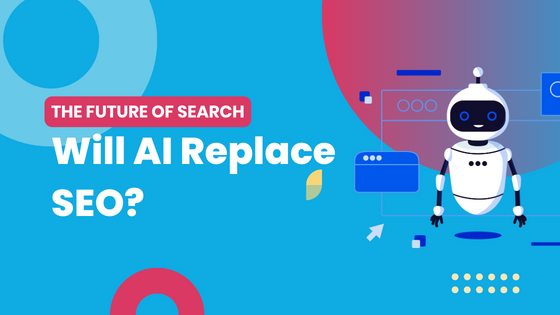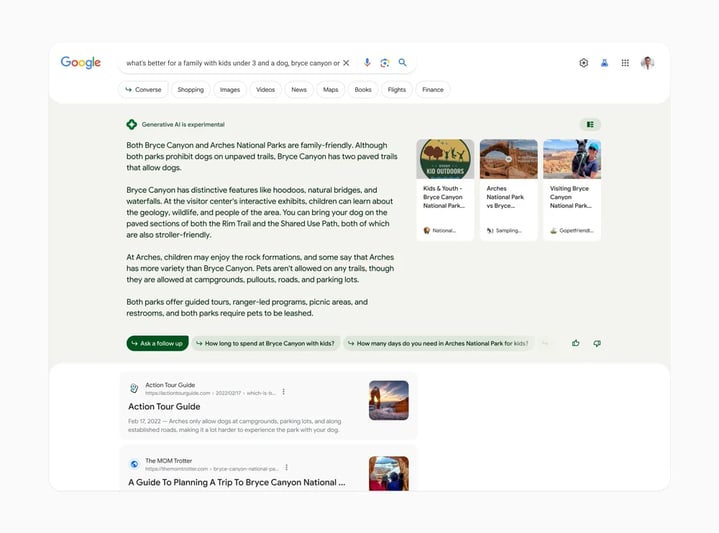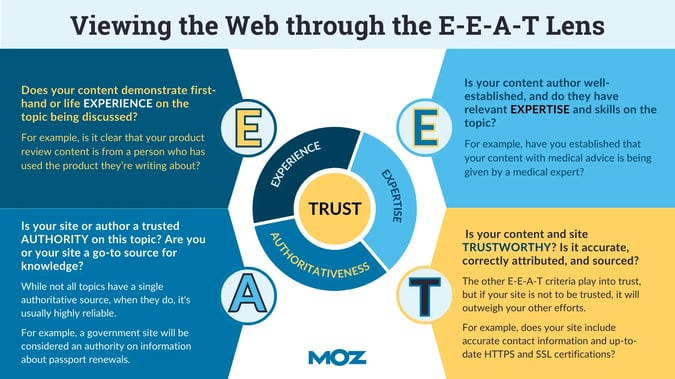






AI has been a hot topic for a while now, and it's about time we shared our take on it.
At some point we've all wondered at the possibility of AI taking over our jobs, and we're right to be scared with the profound impact it has had, especially within digital and content marketing.
In this blog we'll look back upon the rise of AI, what the future of AI and search looks like, and how Six & Flow plans to tackle the challenges being posed by AI.
AI For SEO: The Rise of AI
Admit it or not, we’re all enjoying the benefits of AI and while our lives don’t necessarily depend on it (yet), it would undeniably be a huge inconvenience not to have AI in our lives anymore.
From using Siri for every trivial task to using ChatGPT for projects, job applications, drafting emails, retrieving codes, analysing data, and generating ideas, this doesn’t even cover 10% of the things that ChatGPT is used for.
We are quite literally surrounded by AI and may just be a few steps away from an AI takeover (just kidding!)
Looking at AI solely from a content perspective, AI has become an integral tool for content creators.
Need ideas?
Got a writer’s block?
Don’t feel like doing keyword research?
Need help summarising a long piece of content?
Want to expand an article that’s only halfway through?
Does background research feel too overwhelming?
AI-generated content has been tremendously beneficial in improving the way we approach content marketing.
AI & Its Integration Into Google Search
Over the past few years, even Google has integrated pretty well with AI.
From being able to incorporate multiple languages, to letting users search with a variety of inputs like an image or even by humming a tune.
In fact, the new generative AI capabilities are set to take Google search and its user experience to a whole new level.
 Source: How Google is improving Search with Generative AI, Google
Source: How Google is improving Search with Generative AI, Google
Google’s AI-powered search uses all the information from the web to generate answers for the query being searched, and, to make the user journey easier, provides recommended follow-up questions to dive deeper into the topic offering quality search results to the user. This capability is a godsend for every curious soul out there, offering them various perspectives on the topic they wish to explore.
This extends to improving users’ shopping experience as well, featuring products along with their associated features to address the different demands of each user like reviews, ratings, prices, product images, etc.
The Future of SEO in the Age of AI
With Google’s increasing focus on improving user experience with its AI-powered search engine, marketers like us have been noticing significant transformations in SEO. While AI-generated content has given us a certain advantage, saving time and helping us explore and research more efficiently, it’s fair to question whether will AI replace SEO.
Let’s dive in deeper to see what the future of using AI for SEO looks like:
1. Reduced Click-Through Rates
As a user, I have always been a fan of Google snippets, which would allow us to quickly scan through the SERP and get the information we needed without having to visit another web page. When the information I sought to gain is written there on the SERP it simplifies my user journey, as I now don’t have to go through an entire blog to get the answer to a short, basic question.
As marketers, it’s been a giant thorn in our side!
All that work that we put into selecting a topic of interest, researching, selecting keywords, writing content, optimising it, etc. goes to waste when anyone can just peek at it through snippets without visiting our website.
They provide us with an opportunity to optimise content specifically for featured snippets, increasing the chances of our content being showcased prominently at the top of search results. By employing methods such as structured data markup and strategic keyword use, we can strategically position our content to capture coveted snippet spots, ultimately driving more traffic and visibility to our website.
Taking it to the next level, Google’s AI-powered search engine we discussed above can now pull information from various sources across the web to generate content directly on the Search Engine Results Pages (SERPs), along with offering follow-up questions to address users’ queries better.
2. Better User Experience = More Traffic
On the contrary, as Google's generative AI capabilities aim to elevate the user experience, people will resort to Google Search more often than they already do, with the search engine providing comprehensive answers and even suggesting follow-up questions.
Owing to the increase in search activity, "roughly 70% of web analysts predict their blogs will get more traffic than before when AI is integrated into search engines" (The SEO Evolution, HubSpot).
Depending on the type of content you create, you can leverage your human perspective and opinions to deliver content that AI can’t possibly offer to gain more web traffic, including better quality leads as a result of their positive user experience.
3. Human-Crafted Content > AI-Generated Content
Continuing our statement above, AI may be capable of creating relevant results in no time, but there’s one thing that AI can’t offer - perspective! With the rising demand for using AI for SEO, the web is crowded with low-quality AI-generated content which is super basic and honestly generic in nature.
Imagine having a conversation with someone about something as simple as the weather. If the conversation is centred around generic information like - the temperature will be 7° with a possibility of rain during the day, this exchange of information is absolutely vague and will not help move the conversation forward.
However, talking about your opinion on the temperature, whether you like or don’t like the rain, or even how the rain might have affected your plans, will help you better connect with the other person and help move the conversation forward.
4. Change in Search Algorithm
With AI-powered search engines being enabled, Google will continue to make changes in the algorithm, keeping us marketers on our toes. These changes will make it imperative to prioritise user intent and their experience as a result of which SERP will reward pages with high-quality, relevant, and personalised content. By leveraging AI-driven insights and continuously adapting to algorithmic shifts, we can easily win against AI-generated content.
Content Marketing: Six & Flow Style!
We’re a playful lot here at Six & Flow, and we try to let our content reflect that.
As a fun and energetic brand, our focus is on maintaining a conversational tone while delivering value to users.
When it comes to AI, we have truly embraced its potential and incorporated it into our content marketing strategy.
While AI takes care of time-consuming tasks like research, we rely on our experience and expertise to create content that resonates with our audience.
We found the perfect balance between using AI as a helpful tool and infusing our own creativity and insights to produce valuable and authentic content.
How do we plan to approach our content marketing with the increasing integration of Google Search and AI?
While crafting our marketing strategy for the year 2024, we took a deep dive into the personas we identified to be able to better understand the challenges and pain points they come across. This opened up various topics and themes of content for us to focus on, that would be specific to our target audience.
More importantly, our main objective this year is to focus on humanising our brand, which we aim to do by storytelling, incorporating the brand’s vibrant personality within our content, and following Google’s E-E-A-T guidelines:
- Experience - This latest guideline from Google attempts to reward content that is humanised with experience on the subject matter. Taking inspiration from our first-hand experiences with various industries our goal is to make our content more personalised by offering our opinions based of off our experiences within that subject matter.
- Expertise - We’re fortunate to house a team with expertise in various fields of marketing, sales, operations, and customer service. We will continue to curate content deriving from their day-to-day practical expertise.
- Authoritativeness - We will prioritise generating content that not only shows expertise, but also establishes our brand as a trusted authority by providing accurate, well-researched information derived from experience and expertise.
- Trustworthiness - Transparency is an important factor that helps foster a sense of trustworthiness, and we at Six & Flow are all about transparency within the team and beyond as well! Following the other guidelines - experience, expertise, and authoritativeness - we ensure that our content displays information that users can rely on.
 Source: What does E-E-A-T mean in SEO?, Moz
Source: What does E-E-A-T mean in SEO?, Moz
Final Verdict: Is AI a Friend or Foe?
Now that we've discussed the possibility of AI taking over our jobs (or worse, taking over the world), along with the various ways in which it has caused monumental changes in user experience, content marketing, SEO, and Google Search, what do you think AI is - a friend or a foe?
Let's take a step back. Now, imagine a freshly hired intern at your marketing agency beaming with fresh ideas that they have gathered having observed people and other things around them. While they have great potential and are really talented as well, you wouldn't necessarily trust them with a big client just yet now, would you?
Why?
Because they lack the experience, expertise, and authority to deal with such a big project.
We like to think of AI similarly, a really smart tool with a lot of potential that produces great results by observing its database but lacks the ability to generate personalised and high-quality content.
As Kate Byers, Growth Marketing Director of Semrush puts it "AI tools can be amazingly powerful if used correctly. Just keep in mind that they're just that: tools. Use them to leverage your expertise — not to replace it."







